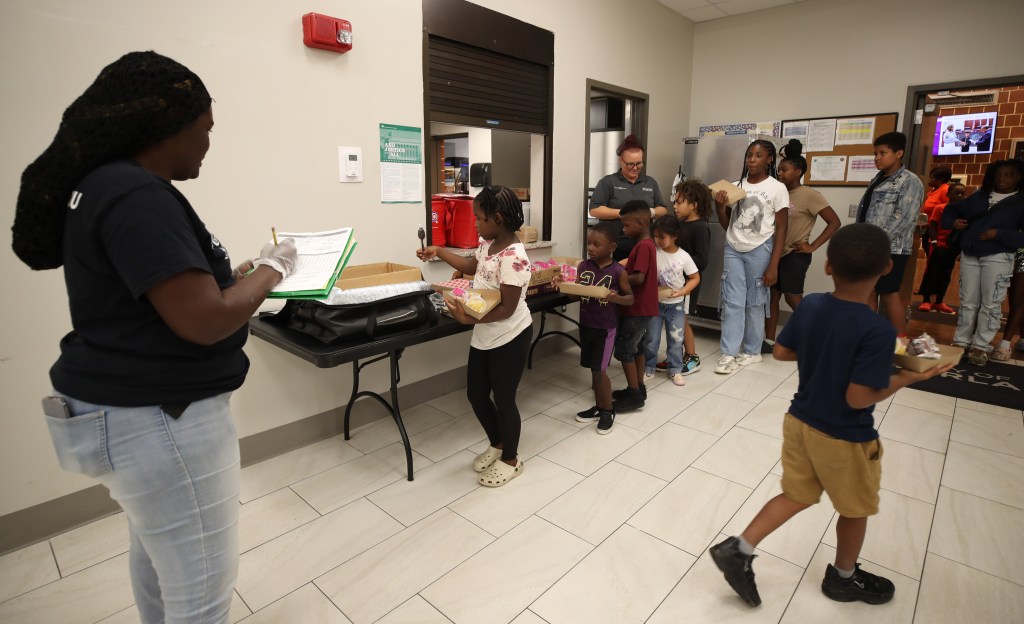TALLAHASSEE – State officials say they have forgone millions of dollars in new federal food assistance money because they have more than enough programs to feed hungry Florida children this summer.
But hunger activists say the numbers tell a different story.
“What the state is trying to say is that they don’t need any other programs in the state,” said Skye Beard, Florida state director for the nonprofit group No Kid Hungry. “I wish that was true!”
While it’s too late for Florida to change course and impact children this summer, 185 anti-hunger organizations recently sent a letter to Gov. Ron DeSantis and other state leaders urging Florida to apply for the funds before the Aug. 15 deadline for 2025.
“Summer is a time every year when kids get hungry,” Beard said.
According to a recent report from Feeding America, a national network of food banks, pantries and community organizations working to end hunger, one in five Florida children is experiencing hunger because their families cannot buy enough food to supplement the free lunches they receive at school during the school year.
 Children watch TV during the Summer Breakspot program at Callahan Neighborhood Center in Parramore on Friday, July 5, 2024. The program provides free meals (breakfast, lunch, snacks and dinner) at more than 4,000 locations across Florida. (Ricardo Ramirez Buceda/Orlando Sentinel)
Children watch TV during the Summer Breakspot program at Callahan Neighborhood Center in Parramore on Friday, July 5, 2024. The program provides free meals (breakfast, lunch, snacks and dinner) at more than 4,000 locations across Florida. (Ricardo Ramirez Buceda/Orlando Sentinel)
Fewer than 10 percent of Florida’s 672,324 elementary school students who receive free or reduced-price lunches during the school year receive them over the summer, according to a report by the Food Research Action Center, a nonprofit that works to end hunger caused by poverty.
“Summer is always a time of increased demand as low-income families on tight budgets absorb the financial impact of feeding one or more children at home,” said Greg Higgerson, chief development officer at Second Harvest Food Bank of Central Florida.
Second Harvest said it has seen a 95% increase in the number of people using its online search tool to find food pantries over the past year.
Florida officials in December turned down the opportunity to get $259 million through a new program called SUN Bucks, administered by the U.S. Department of Agriculture, which also runs the school lunch program.
The new program would have provided $120 in food benefits to parents of about 2.1 million Florida school-age children who receive free or reduced-price school lunches during the school year, supporters said.
Florida is one of 12 states that chose not to participate in the program.
Mallory McManus, a spokeswoman for the Department of Children and Families, which administers the federal school lunch program in Florida, said Florida did not need the additional resources.
“We expect the state’s full commitment to serving children to continue to thrive this year even without the additional federal programs that always come with federal constraints,” she told the Sentinel in December and other news outlets as recently as June 21.
McManus did not say what that “all-out approach” means, what other programs Florida offers to food-insecure children, or what conditions there are to the federal funding beyond the requirement that the state cover administrative costs.
But Beard said the state administers several other federal food assistance programs, such as the school year lunch program, that have similar “conditions” as SUN Bucks.
Florida was required to contribute $12 million to share the administrative costs of running the new program, a tiny fraction of the funding it was supposed to receive in return.
This isn’t the first time Florida has balked at participating in federal food assistance programs: In 2021, the state turned down more than $800 million in aid that would have fed 2.2 million children during the COVID-19 pandemic, but then reconsidered after pressure from nonprofits and politicians to accept the funds.
The department continued to operate its pandemic-related summer food assistance program for two more years, but it ended last summer.
The new SUN Bucks program aimed to replace this.
Beard said the state’s decision means Florida’s neediest families are missing out on the new program’s $40 per child per month, or $120 for the entire summer, that parents could have spent at grocery stores and farmers markets.
“The state has nothing to replace the loss of SUN Bucks,” she said.
 Children watch TV during the Summer Breakspot program at Callahan Neighborhood Center in Parramore on Friday, July 5, 2024. The program provides free meals (breakfast, lunch, snacks and dinner) at more than 4,000 locations across Florida. (Ricardo Ramirez Buceda/Orlando Sentinel)
Children watch TV during the Summer Breakspot program at Callahan Neighborhood Center in Parramore on Friday, July 5, 2024. The program provides free meals (breakfast, lunch, snacks and dinner) at more than 4,000 locations across Florida. (Ricardo Ramirez Buceda/Orlando Sentinel)
The new program was meant to complement other summer meal programs offered by the state, including Summer Break Spots, another federal program that will provide up to 16 million meals to children at hundreds of locations across the state.
But the reach is much smaller than school lunches, because not all poor families can afford to take their children to breakfast and lunch locations, so SUN Bucks, which allows parents to buy food to take home, is more convenient, Beard said.
“This is a statewide concern that impacts colleagues, friends and family in our communities who are really facing hardships,” Beard said, adding, “It’s very disappointing that the state of Florida did not take advantage of this in 2025.”


